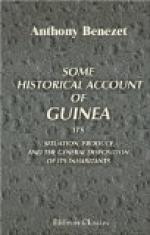[Footnote B: By this account of the punishment inflicted on adulterers in this and other parts of Guinea, it appears the Negroes are not insensible of the sinfulness of such practices. How strange must it then appear to the serious minded amongst these people, (nay, how inconsistent is it with every divine and moral law amongst ourselves) that those christian laws which prohibit fornication and adultery, are in none of the English governments extended to them, but that they are allowed to cohabit and separate at pleasure? And that even their masters think so lightly of their marriage engagements, that, when it suits with their interest, they will separate man from wife, and children from both, to be sold into different, and even distant parts, without regard to their sometimes grievous lamentations; whence it has happened, that such of those people who are truly united in their marriage covenant, and in affection to one another, have been driven to such desperation, as either violently to destroy themselves, or gradually to pine away, and die with mere grief. It is amazing, that whilst the clergy of the established church are publicly expressing a concern, that these oppressed people should be made acquainted with the christian religion, they should be thus suffered, and even forced, so flagrantly to infringe one of the principal injunctions of our holy religion!]
[Footnote C: J. Barbot, page 358, 359.]
[Footnote D: Barbot, page 369.]
[Footnote E: W. Smith, page 369.]
[Footnote F: Bosman, page 409.]
As to religion, these people believe there is a God, the efficient cause of all things; but, like the rest of the Guineans, they are superstitiously and idolatrously inclined.
The last division of Guinea from which slaves are imported, are the kingdoms of Kongo and Angola: these lie to the South of Benin, extending with the intermediate land about twelve hundred miles on the coast. Great numbers of the natives of both these kingdoms profess the christian religion, which was long since introduced by the Portugueze, who made early settlements in that country.
In the Collection it is said, that both in Kongo and Angola, the soil is in general fruitful, producing great plenty of grain, Indian corn, and such quantities of rice, that it hardly bears any price, with fruits, roots, and palm oil in plenty.
The natives are generally a quiet people, who discover a good understanding, and behave in a friendly manner to strangers, being of a mild conversation, affable, and easily overcome with reason.
In the government of Kongo, the King appoints a judge in every particular division, to hear and determine disputes and civil causes; the judges imprison and release, or impose fines, according to the rule of custom; but in weighty matters, every one may appeal to the King, before whom all criminal causes are brought, in which he giveth sentence; but seldom condemneth to death.




